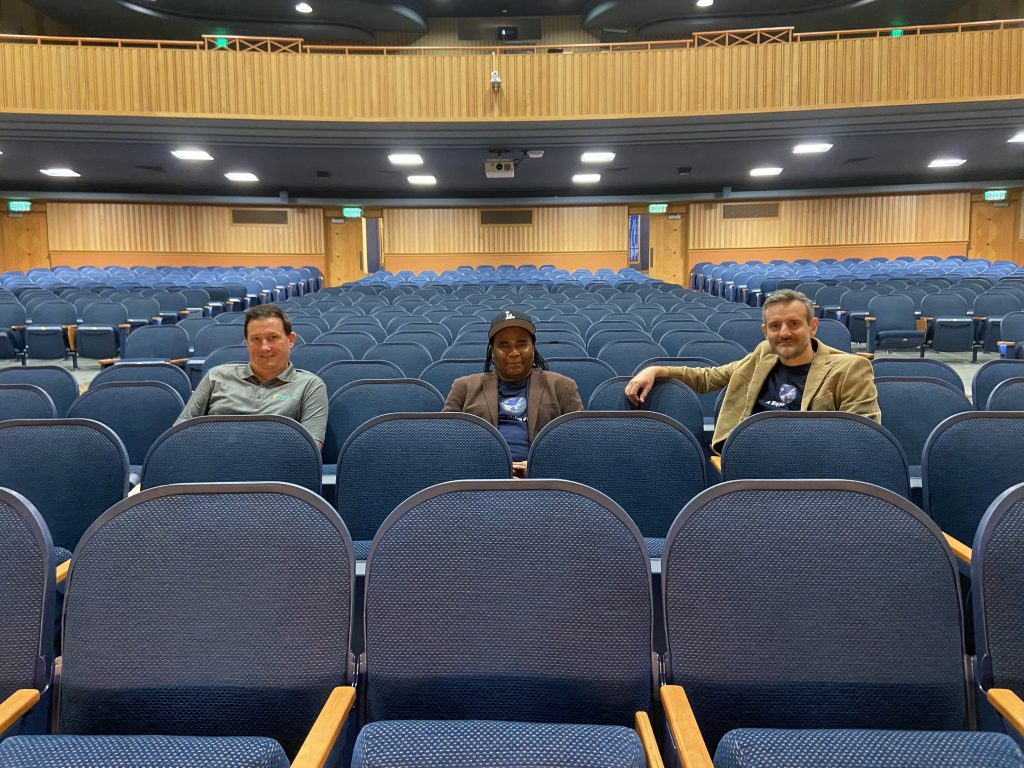New Documentary Highlights Milwaukee’s ‘Housing First’ Homelessness Strategy
"Beyond the Bridge: A Solution to Homelessness" presents Milwaukee's response to the crisis as a blueprint for other communities.

(Left to right) James Mathy, county Housing Administrator, and filmmakers Don Sawyer and Tim Hashko. Photo taken July 31, 2024 by Graham Kilmer.
Has Milwaukee County cracked the code to addressing homelessness? A pair of filmmakers think so.
Filmmakers Don Sawyer and Tim Hashko have focused their lenses on the issue of homelessness for the past decade, beginning with a film released in 2015 called “Under the Bridge: The Criminalization of Homelessness,” which criticized the response to homelessness in the City of Indianapolis.
Their new film, “Beyond the Bridge: A Solution to Homelessness” takes a close look at the response from local governments in Houston and Milwaukee, and concludes that they have developed a successful model for ending homelessness.
The key to Milwaukee’s success is collaboration, the filmmakers said, with a coordinated response, led by the county, involving both private and public institutions.
“Community collaboration is the key,” Sawyer said, “But placing that homeless response system upon a foundation of housing first, housing and services, versus shelter, which a lot of communities are stuck on.”
The institution at the center of Milwaukee’s homeless response is the county’s Housing Division, which is already unique in that it is a housing-focused agency located within a larger human services agency: the Department of Health and Human Services. Milwaukee has, in recent years, regularly had some of the lowest point-in-time counts for homelessness in the nation. These counts are used as a benchmark by government agencies including the U.S. Department of Housing and Urban Development (HUD).
James Mathy, Housing Administrator for Milwaukee County, said the film is an opportunity to promote the Housing First model. “To be able to say that the solution is coordination, housing and services, and not criminalization and forced treatment and those different types of things,” he said.
After making their first movie, Sawyer and Hashko decided to look for solutions to the crisis of homelessness in the U.S. It was Sam Tsemberis, the creator of the Housing First model, who tipped them off to what was happening in Milwaukee, Hashko said. After coming to the city off and on for the past seven years, they have come to view Milwaukee’s response as a “blueprint” for other local governments to follow.
Looking at Milwaukee from a national perspective, the filmmakers say they see a local response that is working far better than others around the country.
“The biggest criticism is coming from your own community,” Sawyer said. “It is a model for the rest of the country.”
The film will be screened in Milwaukee for the first time at Marquette University‘s Varsity Theatre on Thursday, Aug. 1. The screening is free to attend and afterward, Derek Mosley will lead a discussion with Mathy, film participant Jeff Stingley, Amy Linder, president and CEO of United Way; and Wendy Weckler, Executive Director of Hope House; and Milwaukee County Executive David Crowley.
The county executive said his predecessor, Chris Abele, deserves credit for bringing the Housing First model to Milwaukee and overseeing the development of the coordinated response system the filmmakers are now highlighting.
“Then when I come in, as a person who has experienced housing instability — I’ve been evicted and been homeless — and knowing that we want to be the healthiest county in the state of Wisconsin, working on a strategic plan; when I first got here, this was a no brainer to continue to actually make investments,” Crowley said.
Under Crowley, the county has allocated millions to housing prevention programs, supporting the development of affordable housing and developing new emergency housing. “We are putting our money exactly where our mouth is,” Crowley said.
The county executive said he hopes the film will help tell Milwaukee’s story, and potentially attract attention at the state and federal level where resources can be allocated to further address homelessness.
“Because that’s what we need,” Crowley said. “We need people at the table.”
If you think stories like this are important, become a member of Urban Milwaukee and help support real, independent journalism. Plus you get some cool added benefits.
Political Contributions Tracker
Displaying political contributions between people mentioned in this story. Learn more.
- June 30, 2016 - David Crowley received $1,000 from Chris Abele
MKE County
-
Fellow Judge Testifies in Dugan Case
 Dec 16th, 2025 by Graham Kilmer
Dec 16th, 2025 by Graham Kilmer
-
Key Questions in Dugan Trial Take Shape on First Day
 Dec 15th, 2025 by Graham Kilmer
Dec 15th, 2025 by Graham Kilmer
-
FTA Tells Milwaukee to Crack Down on Fare Evasion — Even Where Fares Don’t Exist
 Dec 12th, 2025 by Graham Kilmer
Dec 12th, 2025 by Graham Kilmer





















Thank you to the filmmakers for this extraordinary view into the issue of homelessness. Happy and proud to see Milwaukee highlighted as a solutions-based community demonstrating a model for other cities. As someone who was homeless as a child and young adult and now working to provide support and resources to underserved and marginalized individuals, I see firsthand the difference we are making here. Thank you to Jim Mathy and the Milwaukee County Housing Division for the extraordinary work they are doing! Can’t wait to contribute to our joint vision of a better future for all.
Bravo!